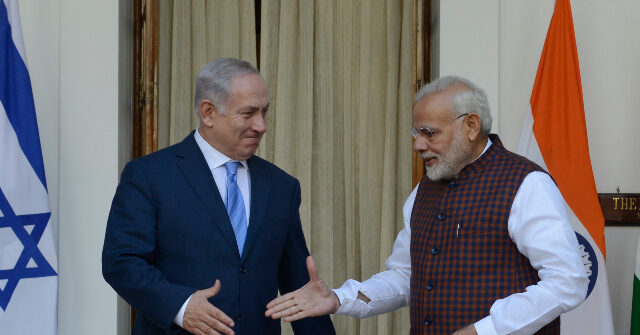Indian Prime Minister Narendra Modi revealed on Friday that he held a phone conversation with his Israeli counterpart Benjamin Netanyahu, who updated him on the country’s ongoing campaign against Iran.
Modi neither condemned nor expressed support for the attacks on Iran, instead stating that India had “concerns” about the hostilities and hoped for peace.
“He briefed me on the evolving situation. I shared India’s concerns and emphasized the need for early restoration of peace and stability in the region,” Modi wrote of his conversation with the Israeli head of government in a social media statement.
Modi’s top diplomat, External Affairs Minister J. Jaishankar, updated some hours later that he held a conversation with his Iranian counterpart, Foreign Minister Abbas Araghchi. He offered no commentary on the content of the conversation, though the fact that the foreign ministers of the two countries spoke, as opposed to the prime ministers of India and Israel, implies that New Delhi holds its relationship with Israel in higher regard than that with Iran.
In the early hours of Friday Netanyahu announced “Operation Rising Lion,” a military attack on several of Iran’s most important nuclear sites and strikes on the locations of several top Iranian military leaders. At press time, the Iranian government has confirmed the deaths of two top nuclear scientists, the commander of the Islamic Revolutionary Guard Corps (IRGC) Hossein Salami, Armed Forces Chief of Staff Mohammad Bagheri, and IRGC air force commander Amir Ali Hajizadeh, among others.
The strikes occurred hours after the United Nations, through the International Atomic Energy Agency (IAEA), passed a resolution condemning Iran for its repeated violations of international nuclear energy laws. IAEA chief Rafael Grossi revealed this week that the agency had reason to believe Iran was operating at least three secret uranium enrichment facilities and had attempted to “sanitize” them to hide them from IAEA inspectors.
In a speech announcing the operation, Netanyahu explained that Israeli intelligence indicated that Iran was close to having enough enriched nuclear material to build an atomic bomb, a risk his government could not allow to persist.
“Eighty years ago, the Jewish people suffered through the Holocaust, perpetrated by the Nazi regime. Today, the Jewish state refuses to be a victim of a nuclear holocaust at the hands of the Iranian regime,” he asserted.
India maintains friendly relations with Israel, one of the few members of the anti-American BRICS economic and security coalition to do so. BRICS’s core membership, in addition to India, consists of Brazil, Russia, China, and South Africa. Notably, Iran became a member in early 2024, meaning India is technically bound through the bloc to the rogue Islamist regime.
While maintaining friendly ties with Iran, India has increasingly expressed support for the Israeli government, particularly in the aftermath of the October 7, 2023, siege of Israel by the Iranian proxy terrorist organization Hamas. India’s foreign ministry, in comments on the situation overnight on Friday, observed that it “enjoys close and friendly relations with both the countries,” offering “all possible support.”
“We are closely monitoring the evolving situation, including reports related to attacks on nuclear sites,” the Indian Foreign Ministry explained. “Existing channels of dialogue and diplomacy should be utilised to work towards a de-escalation of the situation and resolving underlying issues.”
Following the October 7 attacks, both Modi personally and his Hindu nationalist Bharatiya Janata Party (BJP) enthusiastically condemned Hamas, which slaughtered an estimated 1,200 people on that day and abducted hundreds.
“We stand in solidarity with Israel at this difficult hour,” Modi said in a statement immediately after the attacks. “Deeply shocked by the news of terrorist attacks in Israel. Our thoughts and prayers are with the innocent victims and their families.”
BJP spokesman RP Singh called Hamas “worse than ISIS” and emphasized that “they started it,” so Hamas and its supporters could not complain about any response from Israel.
While for many years India extended solidarity to the Palestinian cause, the Modi government has increased its closeness to Israel. Even before Modi, however, Israel has for decades offered India critical military resources to protect itself from neighboring Pakistan, an Islamist regime allied with Iran and the world’s anti-Israel causes. In 1999, for example, Israel provided weapons that helped rapidly conclude a conflict between India and Pakistan known as the Kargil War.
Israeli officials were rapid in extending support and condolences in May at the onset of the latest conflict between India and Pakistan, triggered by a radical Islamist attack on a tourist site in Kashmir.
“Our thoughts and prayers are with the victims and their families. Israel stands with India in its fight against terrorism,” Netanyahu said at the time, calling the incident a “barbaric terrorist attack.”
Later that month, India was among the first countries to condemn the assassination of Israeli diplomats in Washington, DC. Jaishankar, the external affairs minister, declared, “The perpetrators must be brought to justice.”
“Thank you, dear friend!” Israeli Foreign Minister Gideon Sa’ar replied in a social media message.
Follow Frances Martel on Facebook and Twitter.
Read the full article here


